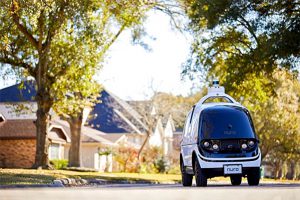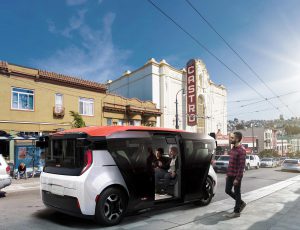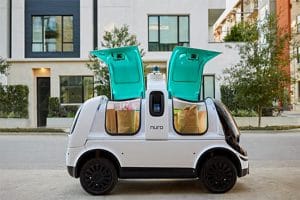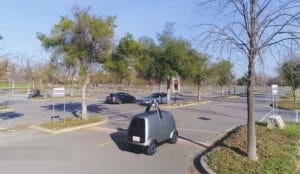
Nuro’s been given the green light to begin testing its driverless autonomous vehicles in California.
A pint-sized delivery truck developed by Silicon Valley start-up Nuro has become the first vehicle approved by federal regulator to operate entirely without a driver on public roads.
As many as 5,000 of the vehicles – dubbed R2 in a nod to the excitable little droid from the Star Wars series – could be cruising U.S. roads during the next two years. The announcement by the National Highway Traffic Safety Administration could signal that other companies, including General Motors, will soon get authorization to publicly test out vehicles without driver’s seats, pedals or steering wheels.
“As the first company to be granted approval for a self-driving vehicle exemption, it’s an important moment for Nuro and a milestone for the industry,” Nuro co-founder Dave Ferguson wrote in a blog post. “This decision provides regulatory certainty for Nuro to operate our second-generation self-driving vehicle, built to carry packages instead of people.”
(Toaster-shaped Niro R1 could soon pop up as a driverless delivery van.)
Nuro is based in Mountain View, California, a region where nearly 50 different companies are currently developing autonomous vehicle technologies. A number of them have already begun testing vehicles on public roads. That includes Google spinoff Waymo which in late 2018 launched an autonomous ride-sharing service in Phoenix. It eventually hopes to expand that venture, Waymo One, nationwide.
For now, however, Waymo and its competitors must have a backup human “operator” in their vehicles at all times, ready to take control in an emergency. A number of those companies, including GM, have applied for permission to begin testing completely autonomous vehicles. But, this marks the first time one of them has been granted approval to do so by NHTSA
The agency says it will “closely monitor Nuro’s operations,” and the vehicles are currently limited to operating at speeds under 25 mph. They will be barred from entering freeways and other limited highways, as well.
“As always, we will not hesitate to use defect authority to protect public safety as necessary,” said Acting NHTSA Administrator James Owens in a statement. But Owens said the agency wants to give companies like Nuro the opportunity to begin testing “innovative vehicle designs, which hold great promise for future safety improvements.”
Proponents of driverless vehicles – including Mark Rosekind, the NHTSA administrator during the final years of the Obama administration – contend that fully driverless vehicles eventually will become much safer than human-operated vehicles while also helping reduce traffic congestion.
But not everyone is quite as confident. The decision to approve Nuro’s petition drew fire from a number of groups, including the Center for Auto Safety.
(Kroger launches driverless delivery pilot in Scottsdale.)
“We don’t understand how NHTSA can possibly justify prioritizing this petition over the dozens of actual safety rules and enforcement actions that continue to lay fallow while they plow corporate selected ground,” said CAS Executive Director Jason Levine.
Observers are watching to see whether NHTSA will follow through on other petitions to begin testing driverless vehicles. GM last year asked the agency to give the okay to a modified version of its Chevrolet Bolt EV which it was expected to use for a ride-sharing pilot similar to Waymo One. Last month, GM’s San Francisco-based autonomous vehicle service, Cruise LLC, unveiled a vehicle specifically designed for driverless operation.
NHTSA says it has no update on the GM application.
Initially, the pod-like Cruise Origin is expected to serve as a ride-sharing shuttle. But Cruise CEO Dan Ammann last month said a delivery version could follow. The R2 is smaller than the Origin and is designed to handle “last-mile delivery of consumer products, groceries and hot food from local stores and restaurants,” said Nuro’s Ferguson.

A prototype Cruise Origin is shown in San Francisco’s busy Castro District. It too is expected to be a driverless autonomous vehicle.
Driverless trucks and delivery vehicles are expected to become commonplace in the coming decades. Some are planned for long-distance operation, a move that proponents believe will sharply reduce the cost of operating conventional 18-wheelers and smaller trucks.
Others, like the Nuro R2, will focus on last-mile deliveries. Domino’s has experimented with that idea on several occasions, including a project using modified Ford Focus sedans near the fast food chain’s Ann Arbor, Michigan, headquarters.
(Cruise reveals Origin of its coming autonomous fleet.)
One of the challenges such operations face is how to get goods from the vehicle to consumers. That has triggered experiments with robots and even drones. For now, those expecting deliveries by an R2 will have to go down and get their packages from the delivery vehicles.


